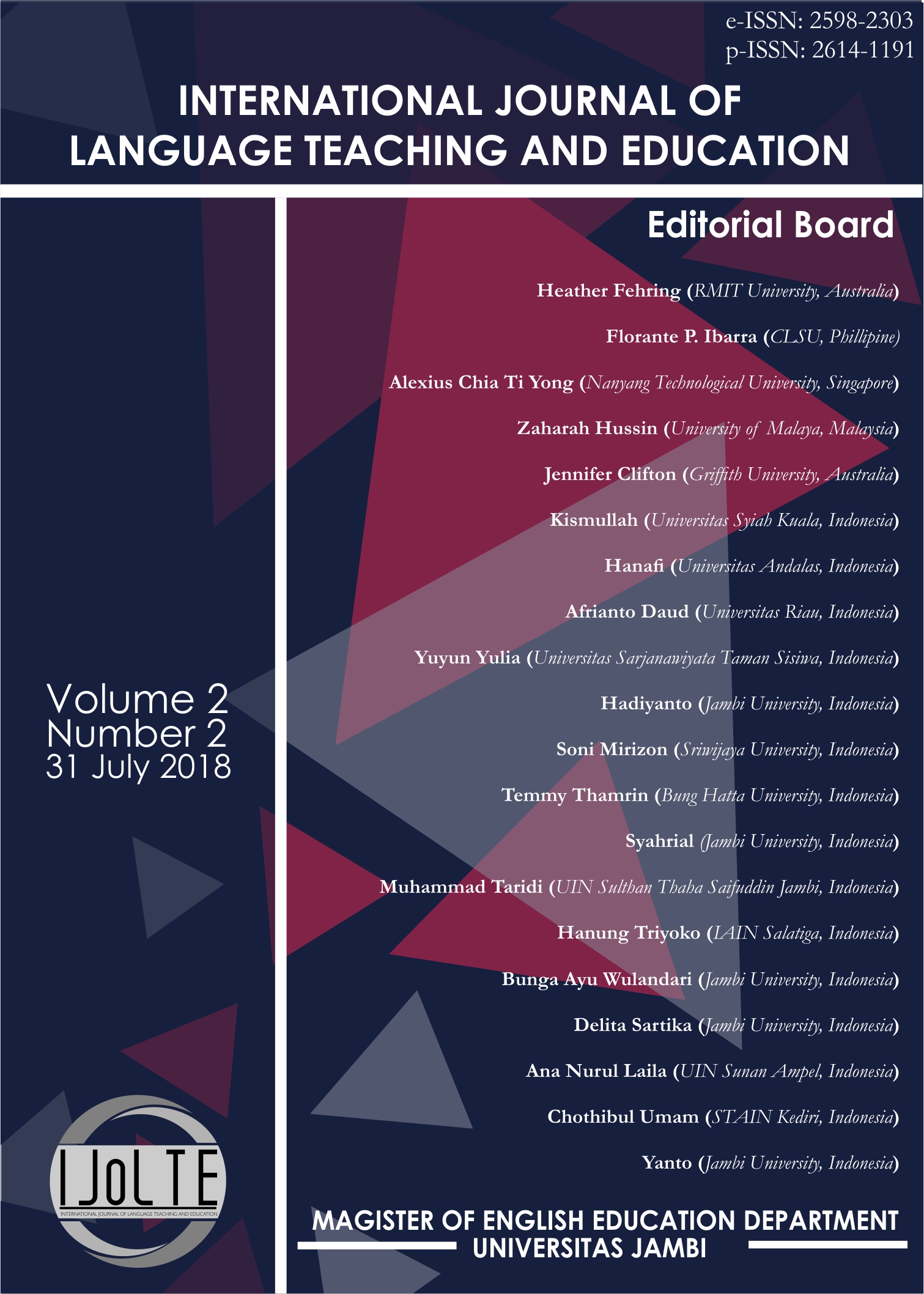An Analysis of Grammatical Errors in Writing Recount Text at the Eighth Grade of SMP Negeri 20 Kota Jambi
DOI:
https://doi.org/10.22437/ijolte.v2i2.5205Abstract
This study aims to analyze and classify the types or mistakes of students using simple past tense in writing text recount. In addition, this study also aims to determine the cause of errors made by the students using simple past tense in writing text recount,
This research used qualitative methods. Meanwhile, the research design used is case study. Furthermore, the writer chose the 8th grade students and observed 26 students. The writer used a written test and interviews to gain the data from some students and an English teacher.
Based on this research, it is found that students do all kinds of errors (omission, addition, selection and misordering). The type of error most often done by the students was omission error with 166 errors or 38.97%. The second position was a selection error with 162 errors or 38.03%. The third position was the addition error with 67 errors or 15.73%. Then the last position was misordering error with 31 errors or 7.28%. In addition, the errors were caused by the complexity of the English system itself and not because of the influence of the Indonesian system (intralingual transfer). Moreover, students lacked of understanding of the grammar that became the cause of the error. In this study, most students did not understand verb 1,2,3 as well as the proper use if “be†in a sentence. This suggested that students had difficulty with the use of grammar in writing
Downloads
Downloads
Published
Versions
- 2018-08-01 (1)
- 2018-08-01 (1)
How to Cite
Issue
Section
License
The Authors submitting a manuscript do so on the understanding that if accepted for publication, copyright of the article shall be assigned to International Journal of Language Teaching and Education (IJoLTe) and Magister Program of English Education Department, Universitas Jambi as publisher of the journal. Copyright encompasses rights to reproduce and deliver the article in all form and media, including reprints, photographs, microfilms, and any other similar reproductions, as well as translations.
IJoLTe keep the rights to articles that have been published. And, the authors are permitted to disseminate published article by sharing the link of IJoLTe' website. Authors are allowed to use their works for any purposes deemed necessary without written permission from IJoLTe with an acknowledgement of initial publication in this journal.
IJoLTe and Magister Program of English Education Department, Universitas Jambi, and the Editors make every effort to ensure that no wrong or misleading data, opinions or statements be published in the journal. In any way, the contents of the articles and advertisements published in IJoLTe are the sole and responsibility of their respective authors and advertisers.
If the article was jointly prepared by more than one author, any authors who submitting the manuscript warrants that he/she has been authorized by all co-authors to be agreed on this copyright and license notice (agreement) on their behalf, and agrees to inform his/her co-authors of the terms of this policy. IJoLTe will not be held liable for anything that may arise due to the author(s) internal dispute. IJoLTe will only communicate with the corresponding author.
By submitting the article/manuscript to this journal, the authors agree with this policy and consciously agree that IJoLTe does not provide royalties or other fees to the authors for their published articles. By agreeing this policy, IJoLTe ensures that published articles are publicly accessible and will be free of charge for the readers. No specific document sign-off is required.
Users of this website will be licensed to use materials from this website following the Creative Commons Attribution 4.0 International License. Please use the materials accordingly
You are free to:
- Share — copy and redistribute the material in any medium or format
- Adapt — remix, transform, and build upon the material for any purpose, even commercially.
- The licensor cannot revoke these freedoms as long as you follow the license terms.





